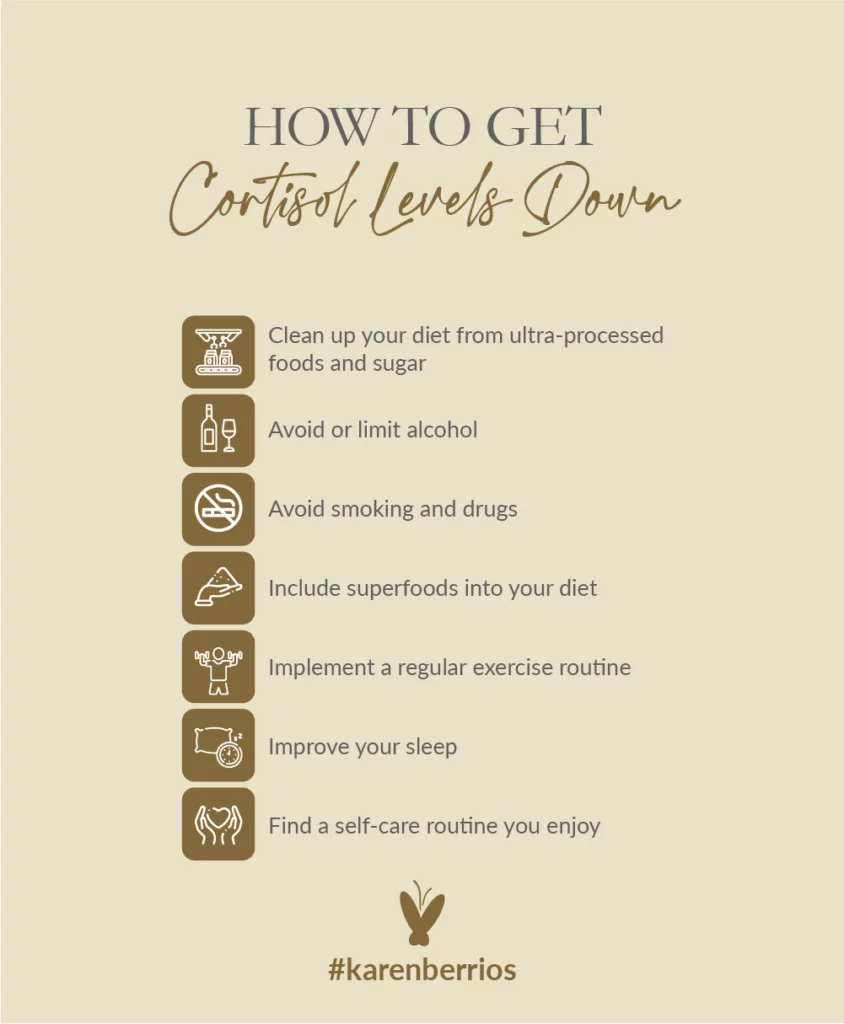

How to Get Cortisol Levels Down?
Cortisol Levels. When talking about stress, we’re actually talking about one of the most important hormones in the human body: cortisol. And even though a healthy dose of this hormone is essential for the optimal function of your body, the problem occurs when the levels become critical and turn from acute to chronic. That’s when it becomes extremely important to get cortisol levels down.
What is Cortisol?
Cortisol is one of the steroid hormones produced by the adrenal glands on top of your kidneys. Like every other hormone, it plays a variety of chemical functions within your body that act as communication between your organs, tissues, and your central nervous system.
Cortisol is also known as the stress hormone as it gets released in situations when your stress is through the roof. Whether there’s a lion chasing you, a car swerves into the lane in front of you, or you’re gearing up to take a school test, your body responds by elevating its cortisol levels to help you deal with stress.
It’s a natural response of the human body and it’s supposed to help lower inflammation and regulate your stress levels by reducing your blood pressure and glucose levels as well as promoting your body’s metabolism of fats, proteins, and carbs.
During acute stress, your body responds to immediate danger or injury, and your adrenal glands respond by elevating your cortisol levels and turning on your “fight or flight” mode, or simply put: survival. It’s what helps give you a boost of energy so you can run from an attack or turns the stress into focus so you can concentrate on a very important exam.
On the other hand, during chronic stress, your body elevates cortisol levels without an actual danger present. It responds to anxiety, frustration, chronic illness, or a prolonged state of inflammation. This is when high levels of cortisol become extremely harmful.
What are the Symptoms of High Cortisol?
The symptoms of high cortisol are sometimes hard to pinpoint and isolate as they might be very similar to a variety of different diseases or illnesses. Some of the most common symptoms include:
- Weight gain, especially around the midsection and upper back (visceral fat)
- Muscle weakness and fatigue
- Overall fatigue and tiredness
- Problems with digestion and acne
- Bloating and gas
- Often headaches
- Irritability
- Brain fog and difficulty concentrating
- High blood pressure
- Dry skin and thinning hair
High cortisol is also often referred to as the Cushing syndrome which is known for fatty deposits around your abdomen, between the shoulders, and often face and neck, as well as purple stretch marks and slow-healing injuries.
The most common cause of high cortisol is chronic stress, but there are a few other reasons why this hormone could be elevated. These include problems with your pituitary gland whose main role is hormone regulation in your entire body, tumors of the adrenal glands, side effects of specific medications, as well as high levels of estrogen.
Ways to Lower Cortisol Levels
Even though some of these serious causes for high cortisol levels might not be easy to manage without medical or alternative professional help, if the main cause is chronic stress, you might be more capable of dealing with it than you think. Certain lifestyle changes can have a powerful effect on lowering your cortisol levels and helping you mitigate its dangerous effects on your overall health.
Healthy Diet
One of the most important ways to help lower your cortisol levels and reduce inflammation is by implementing a healthy and nutritious diet. The goal is to eliminate and avoid ultra-processed foods, sugars, and other inflammatory ingredients while adding a variety of powerful plant-based foods and superfoods into every meal.
Let the majority of your meals be filled with vegetables, fruit, nuts, seeds, legumes, and beans, as well as a plethora of superfoods like camu camu berry, ginger, cacao, maca, and more. This way, you’re supplying your body with numerous vitamins, minerals, antioxidants, and adaptogens that directly lower your body’s inflammation and cortisol levels while helping your cells better adapt to stress.
Regular Exercise
Another important way to lower your cortisol levels is by implementing a regular exercise schedule into your week. Exercise has shown to be incredibly helpful in lowering your stress response and helping your metabolism, body composition, digestion, as well as stimulating the production of happiness hormones, serotonin, and endorphins. They stimulate relaxation and help your body transfer from “fight or flight” into “rest and digest” mode.
Find the workout regimen that you enjoy and that helps you feel your best. And don’t think of it as a necessary high-intensity workout style – not everyone needs to run or bike for days. Even a simple yoga class or a long walk will do plenty for your health and cortisol levels.
Better Sleep
Sleep is extremely important for lowering your cortisol levels as well as regulating all other hormones in your body. That’s why it’s crucial to implement good sleeping habits and allow your body to rest, repair, regenerate, and recharge its batteries during the night. Whether you’re someone who needs seven or nine hours of sleep, try to do your best to not sacrifice sleep over anything else.
Focus on creating a good pre-bed routine, ensure your bedroom is dark and comfortable, keep your room temperature moderate to prevent sweating or freezing, remove all technology from your bedroom and turn off wi-fi and other possible sleep and energy disruptors, and avoid blue light-emitting screens at least two hours before bedtime.
Self-Care Rituals
And last, but not least, every person is different and we all relax in a different way. Whether you feel the stress leaving your body when you’re in a bathtub, reading a book, listening to music, meditating, praying, or journaling, find what works for you and stay consistent with it!
Don’t let other people’s ideas of relaxation confuse you. What works for them might not work for you, so find what you enjoy doing and just get into it.

Cortisol levels and Cancer
Science points out how high cortisol levels can have a role in the development and progression of cancer. The high state of inflammation keeps your body in a constant “fight or flight” mode which impairs the function of your immune system and makes it impossible for you to fight off this harmful enemy.
Multiple studies showed how cortisol can directly affect tumor growth and cause cancer to spread at a much faster rate. That’s why keeping your cortisol levels down is one of the most important health goals you can have to protect your body and improve the quality of your life.
Conclusion
High cortisol levels are one of the biggest reasons for the plethora of diseases and infections people face today. It’s become more important than ever to keep them down and help improve your overall health, well-being, and longevity.

hey there
I'm Karen!
I have found my cancer journey to be a positive and profound transformational experience. I’m inspired to share my healing journey here, and trust you’ll find hope, encouragement and purpose as you discover the healing power that lies within you.
Join
The Mailing List!
By signing up for my newsletter, you agree with our Privacy Policy and Terms & Conditions.


